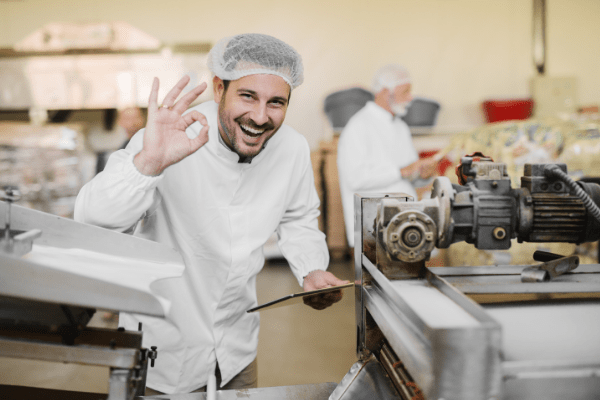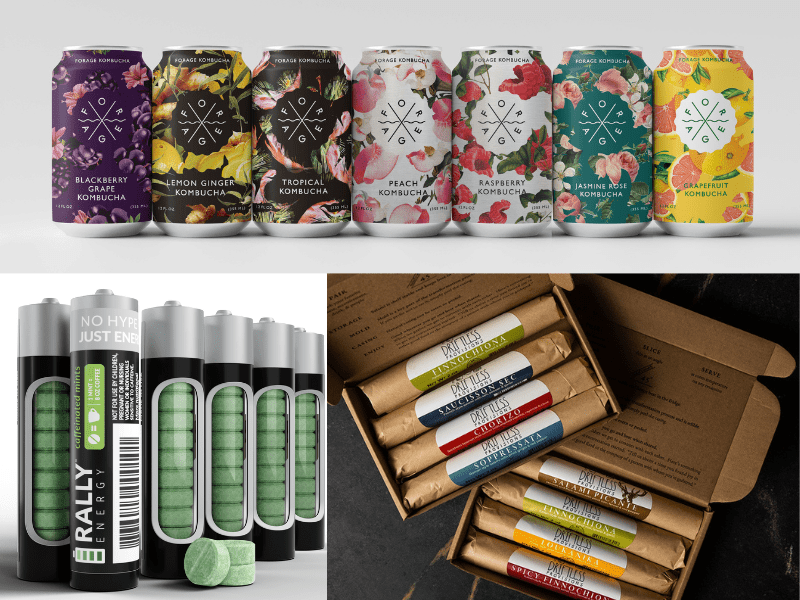Most food entrepreneurs will inevitably face the question of whether to self-manufacture or use a co-packer. For many, this comes after their business takes off and they need to ramp up production, and they realize their home or commercial kitchen will no longer suffice. To meet demand and continue scaling, they must either acquire more manufacturing space and larger-scale equipment or else partner with an established contract manufacturer.
This question can also come for brands later on in their journey, after they’ve been using co-packer for some time. Experiencing continued growth, they wonder if it would be wise to build, buy or lease a manufacturing facility and reclaim ownership of the process. This is what oil ingredients manufacturer and supplier Connoils did—to great success, as founder and CEO Stacy Peterson details in the latest Edible-Alpha® podcast.
No matter when this decision arises, it can be a tough call. So much depends on the team’s strengths, the company’s business model and goals, and the intricacies and uniqueness of the product. Not every scaling food business can—or should—self-manufacture. In some cases, even more established brands are smart to stick with a co-packer, for any number of financial or efficiency reasons.
But for food companies that could feasibly do it, self-manufacturing can have a whole lot of benefits. For starters, they retain the margin they’d lose to a contract manufacturer, and they can save the costs of shipping ingredients and finished products from place to place. They don’t need to meet co-packers’ high minimum order volumes either. Self-manufacturing brands also remain in charge of quality control, so they can ensure that every production run is up to spec—and if it isn’t, they can make adjustments quickly.
Another perk is greater control over ingredient sourcing, as many co-packers want to stick with their own suppliers. Entrepreneurs can also ensure their own facilities have the necessary certifications, such as organic, gluten-free or vegan. This may even open up new revenue streams, such as by manufacturing other brands’ products during down times.
Additionally, self-manufacturing gives entrepreneurs more opportunities to practice their values. For instance, if environmental and social sustainability are baked into the brand’s mission, they can build or lease a green facility, ensure production staff is well compensated well and create the workplace culture they want.
But there are downsides to self-manufacturing too. For instance, most food entrepreneurs will have a lot to learn about manufacturing products at scale. Also, because co-packers have longstanding relationships with suppliers of ingredients, packaging, labels, etc., they can often score inputs at a lower cost.
And then, financially speaking, it can be difficult to raise capital for manufacturing. Banks issue loans for this purpose, but investors may be tepid about sinking money into facilities and equipment. Furthermore, for entrepreneurs hoping to sell their company eventually, private-equity firms don’t always view manufacturing assets favorably.
There is no one-size-fits-all solution to this dilemma. Consider all the pros and cons carefully, consult with trusted advisors and look at what other food businesses have done as examples. FFI has plenty of resources to help, so please reach out!
A female founder who has been at it for 13 years, Stacy Peterson joins Tera to talk about turning a discontinued product line and job loss into a thriving oil ingredients business. The Connoils CEO started solo and steadily scaled her company to become a one-stop shop for formulators of food, beverages, supplements, and other consumer products. Now with a sparkling new manufacturing facility, Stacy discusses Connoils’ next phases of growth.
Listen to the Latest Episode
And now, our roundup of the best food and beverage finance news, events and resources from around the web…
Business Model Insights
- As a founder, what is your highest value activity? (The Intertwine Group)
You wear so many hats: leader, accountant, salesperson, dispatcher. But cultivating relationships with people who can positively influence your business long-term may be the best use of founders’ time. - Producers, manufacturers improving animal welfare practices (New Hope Network)
- What is the best way to reach consumers during and after the pandemic? (FoodNavigator-USA)
Raising Capital
- 3 things women-run companies should consider when seeking financing (New Hope Network)
“Many studies have shown women to be more risk-averse, and often the deck is stacked against them when it comes to financing. It’s time to level the playing field and give women-led or -owned businesses every chance to succeed that their male counterparts have.” - There’s been a groundswell of investor funding in plant-based proteins. It hasn’t led to decreased meat consumption (The Counter)
- Hungry for diversity: Female startup founders take on the challenges of growing a food business (Food Dive)
CPG/National Brands
- Tweets, Receipts and Peloton Riders: Foodmakers Embrace Big Data (Bloomberg)
“Tracking social media buzz is one of the newly honed tools in Kraft’s data collection toolbox, and both the company and its packaged-food peers are increasingly thinking about how they gather and use information like this to speed product development.” - Whole Foods Market Launches Program to Help Shoppers Identify Responsibly Sourced Products (Forbes)
- How Hint Water built and maintains its booming online business (New Hope Network)

Market Trends
- Which food sales will slump as restaurant dining reopens (Food Dive)
Meat is 50% more likely than the average grocery category to see a decrease in sales when restaurants reopen, according to Numerator’s new Grocery Vulnerability Index, while herbs and spices are 46% more likely to skid than other categories. - Is grocery shopping returning to normal, or is ‘normal’ being continually redefined? (New Hope Network)
- U.S. plant-based food retail sales jumped 27% in 2020 (Supermarket News)

Farming and AgTech
- Soil health practices boost incomes, cut costs & increase resilience: SHI, Cargill (AgFunder News)
Based on data collection and in-depth interviews with 100 farms across nine states, the Soil Health Institute concludes that adopting soil health practices resulted in net income increases for 85% of farmers growing corn and 88% of soybean growers. - Why regenerative agriculture must be measured (New Hope Network)
- Why combining farms and solar panels could transform how we produce both food and energy (The Counter)
Deals/M&A
- Food industry part of `SPACtacular’ shift in capital markets (The Food Institute)
Food is among many industries accelerating the use of special-purpose acquisition companies. But are SPACs primed to become the next internet bubble or subprime mortgage crisis? - Bell & Evans teams with Cargill, Rodale Institute to transition 50,000 farm acres to organic (AgFunder News)
- AppHarvest acquires Root AI to add AI-powered harvesting robots to its workforce (AgFunder News)

Industry Events
Virtual Events
- Nutrition Capital Network Spring Investor Meeting: 4/20–4/21
- FFI Raising Equity: 4/20–4/22
- SupplySide Network 365: Ensuring supply chain transparency and stability: 4/22
- Edible-Alpha® Consultant Huddle: 5/3
- Grains Week: 5/3–5/7
- Hirshberg Entrepreneurship Institute: 5/5–5/7
- FFI Financial Management Boot Camp for Meat Processors Part 1: 5/6–5/7
- Food Safety Summit: 5/11–5/13
- Building a Brand that Stands Out: 5/19-5/21
- Natural Products Expo West Virtual Week: 5/24–5/27
- KeHE Holiday Show: 6/8–6/10
- Digital Food & Beverage Connect: 6/15–6/16
- FFI-FaBcap Accelerator Pitch Event: 6/16
- FFI Financial Management Boot Camp for Meat Processors Part 2: 6/17–6/18






